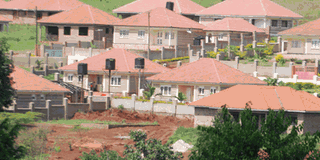VAT on land sales hurting real estate sector - players

A section of Akright housing estate at Kakungulu. PHOTO BY ISMAIL KEZAALA
Kampala- Real estate developers have continued expressing their dismay over Value Added Tax (VAT) on the sale of improved land; saying the move is threatening to suffocate the sector and might increase slums in the country.
The Association of Real Estate Agents Uganda chief executive officer, Mr Vincent Agaba, told the Daily Monitor in an interview that the tax on the sale of improved land “is not friendly” to real estate developers and potential land buyers as it will increase the cost of land.
Mr Agaba said VAT on land transactions will suffocate the sector, as the burden will be passed onto the final land buyer in form high land prices, which, according to him will push away potential buyers.
The Uganda Revenue Authority in April moved to compel all real estate developers to pay the 18 per cent VAT on the sale of improved land, as it explores all possible avenues to increase revenue collections.
Mr Anatoli Kamugisha, the managing director of Akright Projects and president of Property Developers Association, said it is “a bad tax” as it will discourage developers from selling well planned plots of land and instead increase slum development in the country.
“Government should know that real estate developers are already facing competition from people selling undeveloped land and you again add another cost? Government should instead be taxing those selling unimproved land to discourage them and stop the growth of slums,” he said.
URA wrote to some real estate dealers in April this year, asking them to pay the tax arrears relating to the past real estate transactions.
Ms Sarah Birungi Banage, the URA assistant commissioner of public and corporate affairs, however, said VAT on improved land has been in existence since 2001, although there existed ambiguity in the Act which did not define what improved land entailed.
She added that the ambiguity in the law was later removed by defining improved land as that which has utilities such as piped water, electricity, laying stones, constructing access roads or leveling the land, which results into the appreciation of the land’s value.
Mr Agaba, however, said: “Government doesn’t provide such services yet it is supposed to be its responsibility. But when developers incur all the expenses to put up such services, government wants to tax them; why?”
Players also said applying the law retrospectively; where by real estate developers have to pay VAT on land transactions that were concluded years back before the law came into force, might force some of them to close businesses as they may not be able to pay huge sums of money in accumulated arrears.
For instance, URA closed offices of Hossana real estates two weeks ago, demanding that it pays over Shs100 million VAT for an estate near Uganda Christian University, Mukono that was bought so many years ago.
Although the office was reopened, a source close to the matter told this newspaper that the tax arrears have left the firm with a huge financial burden.
Much as URA says some real estate dealers have been factoring in VAT in the price of land but were not remitting the money to URA, Mr Kamugisha dismissed the allegation, saying it is not true.




